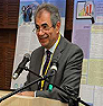Globalization and capital formation in Nigeria
Abstract
No country can achieve sustained economic growth without substantial investments in capital formation. Nigeria is rich in natural resources, but due to inadequate capital and technology, these resources have not been fully tapped and maximized. This study seeks to provide another gateway to unlocking the dearth of capital formation for development by specifically investigating the impact of financial and trade globalization on capital formation in Nigeria within the period 1990–2022. The autoregressive distributed lag (ARDL) technique was adopted for data analysis. The findings of this study indicate that while trade globalization has a negative effect on capital formation in both the long run and short run, respectively, financial globalization exerts a negative effect on capital formation in the long run but a positive effect in the short run. Nevertheless, financial and trade globalization exert detrimental effects on capital formation in the long run. A major policy recommendation is that Nigeria should play a key role in the African Continental Free Trade Area in order to boost her trade and financial competitiveness within Africa and so be able to lunch herself into the global space and thus tap the potential benefits of trade and financial globalization.
References
[1]Chibuzor C, Eleh E. The Impact of capital formation on economic growth in Nigeria. Middle European Scientific Bulletin. 2023; 34: 43-54.
[2]Sarkar P. Trade Openness and Growth: Is There Any Link? Journal of Economic Issues. 2008; 42(3): 763-785. doi: 10.1080/00213624.2008.11507178
[3]Mankiw NG. Principles of Economics. Cengage Learning; 2012.
[4]Jhingan ML. The Economics of Development and Planning. Vrinda Publications (P) Ltd; 2022.
[5]Achanso SA. The impact of the globalisation on the provision of social welfare. JL Policy& Globalization. 2014; 32: 15.
[6]Bhandari AK, Heshmati A. Measurement of globalization and its variations among countries, regions and over time. In: Tausch A, Heshmati A (editors). Roadmap to Bangalore? Globalization, the EUs Lisbon process and the structures of global inequality. Nova Science Publishers; 2007. pp. 69-108.
[7]Bakare AS. A theoretical analysis of capital formation and growth in Nigeria. Far East Journal of Psychology and Business. 2011; 3(2): 11-24.
[8]Nigerian Bureau of Statistics. Nigerian Poverty Profile. Available online: http://www.nigerianstat.gov.ng/pdfuploads/Nigeria%20Poverty%20Profile%2022.pdf (accessed on 10 November 2022).
[9]Olukemi OO. Foreign direct investment and capital formation: Policy implications towards achieving pro-poor growth in Nigeria. Journal of Economics and Allied Research. 2022; 7(1): 48-60.
[10]Akujuobi NE, Ndugbu MO, Akujuobi ABC. Public expenditure and capital formation: Evidence from Nigeria. African Journal of Social Issues. 2022; 4(1): 87-104. doi: 10.4314/ajosi.v4i1.5
[11]Olaosebikan O, Olaniyi RB, Ojekunle FJ. Impact of capital market performance on capital formation in Nigeria. FUOYE Journal of Finance and Contemporary Issues. 2022; 3(2): 148-163.
[12]World Bank. Global Monitoring Report: A Development Emergency. World Bank; 2022.
[13]Ogunjobi J. O, Asaleye AJ, Popoola O, et al. Implications of Human Capital Formation on Output and Employment: Evidence from Nigeria. Asian Economic and Financial Review. 2022; 12(1): 47-57. doi: 10.18488/5002.v12i1.4406
[14]Chenery H. B, Strout A. Foreign assistance and economic development. American Economic Review. 1966; 56(4): 678-733.
[15]Ogieva, O. F, Aigbovo O. Financial integration and gross capital formation in Sub-Sahara Africa. African Development Finance Journal. 2022; 3(1): 69-103. http://journals.uonbi.ac.ke/index.php/adfj
[16]Uremadu SO. Foreign direct investment, liquidity and real capital growth Evidence from Nigeria. International Review of Business Research Papers. 2011; 7(3): 170-193.
[17]Amighini AA, McMillan MS, Sanfilippo M. FDI and capital formation in developing economies: New evidence from industry-level data. Available online: https://www.nber.org/system/files/working_papers/w23049/w23049.pdf (accessed on 2 March 2024).
[18]Ameer W, Sohag K, Xu H, Halwan MM. The impact of OFDI and institutional quality on domestic capital formation at the disaggregated level: Evidence for developed and emerging countries. Sustainability. 2020; 12(9): 1-18.
[19]Mbaluku GN. The impact of foreign direct investment on domestic capital formation: An empirical investigation for Kenya: 1970-2009 [Master’s thesis]. University of Nairobi; 2012.
[20]Muhammad MA, Nor A, Sallahuddin BH. Debt overhang versus crowding out effects: Understanding the impact of external debts on capital formation in theory. International Journal of Economics and Financial. 2016; 6(1): 271-278.
[21]Kanu S. I, Ozurumba BA. Capital Formation and Economic Growth in Nigeria. Global Journal of Human-Social Science: E Economics. 2015; 14(4): 42-58.
[22]Ojimadu P, Aniebo C, Ogu C. Bank credit and capital formation in Nigeria. Journal of Policy and Development Studies. 2016; 10(2): 42-53.
[23]Ila P, Radhika P. Savings and capital formation in India. Available online: https://macrofinance.nipfp.org.in/PDF/PatnaikPandey-savings_and_capital_formation_in_India.pdf (accessed on 2 March 2024).
[24]Omankhanlen AE. The role of banks in capital formation and economic growth: The case of Nigeria. Economy Transdisciplinarity Cognition. 2012; 15(1): 103-111
[25]Rajni P. Linkages between export, import and capital formation in India. International Research Journal of Social Sciences. 2013; 2(3): 16-19.
[26]Ozuzu CS, Ewubare DB. The effect of export earnings on capital formation in Nigeria:1980-2018. IOSR Journal of Economics and Finance. 2020; 11(1): 46-57.
[27]Udude C, Odo S, Okpoto I, Favour EO. Investigating the impact of oil export on gross capital formation in Nigeria. Asian Research Journal of Arts & Social Sciences. 2017; 2(4): 1-12. doi: 10.9734/arjass/2017/32605
[28]Olowe OO. Foreign direct investment and capital formation: Policy implications towards achieving pro-poor growth in Nigeria. Journal of Economics and Allied Research. 2022; 7(1): 48-60.
[29]Pesaran MH, Shin Y, Smith RJ. Bounds testing approaches to the analysis of level relationships. Journal of Applied Econometrics. 2001; 16(3): 289-326. doi: 10.1002/jae.616
[30]Tahir M, Hayat A. Does international trade promote economic growth? An evidence from Brunei Darussalam. Journal of Chinese Economic and Foreign Trade Studies. 2020; 13(2): 71-85. doi: 10.1108/jcefts-03-2020-0010
Copyright (c) 2024 Benedict Ikemefuna Uzoechina, Precious Chidinma Okafor, Ngozi Florence Ezenwobi, Geraldine Amaka Ekwoh, Chika Maureen Okaforocha, Ndubisi John Edeh

This work is licensed under a Creative Commons Attribution 4.0 International License.







.jpg)
.jpg)

